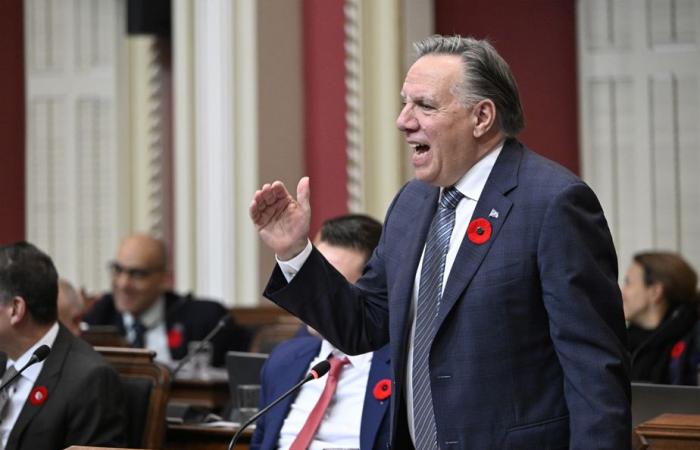(Quebec) François Legault brandishes the use of the notwithstanding clause to force new doctors to begin their practice in the public. After declaring that he wanted to “wean off” the network from the private sector, Christian Dubé admits to having been wrong: the private sector will remain “complementary to the public”.
Published at 9:40 a.m.
Updated at 4:24 p.m.
The Prime Minister threw a wrench in the pond by declaring that Quebec will resort to this exceptional means in Minister Christian Dubé’s bill which wants to force newly graduated doctors to work in the public “during the first years” of their practice.
“We train doctors at great expense in our universities. Then there are some who go to Ontario, there are some who go to the private sector. They say: for a certain number of years, you should work in the public. […] This means that we must use the notwithstanding clause. Oh ! There, Québec solidaire will be angry. The exemption clause, we are not touching that,” thundered Mr. Legault, followed by Gabriel Nadeau-Dubois.
The Minister of Health had not mentioned this scenario until now. On Sunday, he announced his intention to table a bill by the end of the parliamentary session. “I have no comments to make on that,” Mr. Dubé said briefly as he left the Salon rouge. His office specified that “these discussions” will take place when the legislative text is tabled.
In 2012, while he was on the opposition benches, François Legault affirmed that a CAQ government would be ready to use the notwithstanding clause to force doctors who leave the province after their studies to reimburse the cost of their training. He also thought about the issue in 2003 when he was Minister of Education under a PQ government.
With its bill, Quebec wants to curb the exodus of doctors to the private sector, “an increasing trend”, according to the Minister of Health. The government recalls that “the training of a doctor costs, including residency, between $435,000 and $790,000 for Quebec taxpayers and that the number of places to study medicine is limited.”
According to data provided by the firm, 136 family doctors left the public plan during the first years of their practice, between 2020 and 2024. This number is 57 among specialist doctors for the same period.
On Tuesday, the minister argued that the bill on new doctors is a first element of his strategy and that it could be “stronger” than announced and contain other means of slowing down the exodus.
Mr. Dubé mentioned that “it is obvious” that the rules allowing doctors to move back and forth between the public plan and the private sector “must be corrected”. Since March, he has had in his hands a draft regulation approved by the RAMQ to increase the time required to disaffiliate from the public plan. Currently, a doctor can do this up to 19 times a year.
He also showed an appetite for establishing maximum rates that could be charged in private clinics.
Dubé changes his mind
Autre rebondissement mardi. Après avoir déclaré vouloir « sevrer » le réseau de la santé du privé, Christian Dubé admet s’être fourvoyé. Le secteur privé restera « complémentaire au public », a-t-il rectifié.
Christian Dubé a provoqué la surprise mardi matin en affirmant, lors d’une interpellation au Salon rouge, qu’il voulait cesser progressivement d’avoir recours au privé. « Je pense qu’on est rendus très près d’être capables de se sevrer graduellement du privé », a lancé le ministre. Il s’agissait d’un « changement de cap majeur », s’est notamment réjoui Québec solidaire.
Or, le ministre s’est trompé. « J’ai fait une erreur de terme, j’aurais dû regarder dans le dictionnaire avant. Je vais être très, très clair, le privé va rester complémentaire au public, on en a besoin pour servir les patients, je suis content de corriger [mon propos] “, he said afterwards.
Mr. Dubé added that the use of the expression “withdrawal” applied rather to his already known commitment to abolish the use of labor placement agencies in the public network by 2026. However , at the Salon rouge, on the contrary, he used this example to explain his overall “vision” of the place of the private sector in the Quebec health system.
The minister also added that the coming months will be used to “agree on the transition period that we should have” to reduce the contribution of the private sector to health. He made his statements during an interpellation – a parliamentary procedure during which the minister answers questions from the opposition. The exercise focused on “the rise of privatization in health care in Quebec”.
This was timely as the College of Physicians asked the Legault government on Monday to immediately curb the expansion of private healthcare. To which Mr. Dubé said he agreed.
Read the article “Quebec must put the brakes on, believes the College of Physicians”






